Datasheet
Year, pagecount:2007, 7 page(s)
Language:English
Downloads:2
Uploaded:August 09, 2018
Size:558 KB
Institution:
-
Comments:
Macalester College
Attachment:-
Download in PDF:Please log in!
Comments
No comments yet. You can be the first!Most popular documents in this category
Content extract
Source: http://www.doksinet Macalester Islam Journal Volume 2 Macalester Islam Journal Issue 3 Article 5 3-28-2007 Birth Control and Abortion in the Practice and Tradition of Islam Zoe Whaley Macalester College Follow this and additional works at: http://digitalcommons.macalesteredu/islam Recommended Citation Whaley, Zoe (2007) "Birth Control and Abortion in the Practice and Tradition of Islam," Macalester Islam Journal: Vol. 2: Iss 3, Article 5. Available at: http://digitalcommons.macalesteredu/islam/vol2/iss3/5 This Article is brought to you for free and open access by the Religious Studies Department at DigitalCommons@Macalester College. It has been accepted for inclusion in Macalester Islam Journal by an authorized administrator of DigitalCommons@Macalester College. For more information, please contact scholarpub@macalester.edu Source: http://www.doksinet Whaley: Birth Control and Abortion Macalester Islam Journal Spring 2007 page 28
Birth Control and Abortion in the Practice and Tradition of Islam Zoë Whaley ‘09 This paper will explore the issues of birth control and abortion within the religion and tradition of Islam. This paper will draw upon the Encyclopedia of the Qur’an, the Encyclopedia of Islam, and the Qur’an itself. In the first part of the paper I will present the relevant information and expand on it by addressing disagreements that have arisen within Islam regarding these issues. Next, I will comment on the modern implications of the Islamic stance on birth control and abortion. Finally I will forward my assertion that Islamic practice and tradition on the subject of birth control and abortion is, in fact, extremely progressive in comparison to current law and practice in the United States. Published by DigitalCommons@Macalester College, 2007 1 Source: http://www.doksinet Macalester Islam Journal, Vol. 2 [2007], Iss 3, Art 5 Macalester Islam Journal Spring 2007
page 29 Birth Control and Abortion in the Practice and Tradition of Islam Zoë Whaley ‘09 In recent years, contemporary western literature on Islam has saturated both the popular and academic market. Mainstream popular writers have offered suggestions on certain principles deemed inherent to Islam, and retired foreign affairs analysts and Washington officials have lent their voices to the sea of commentary on the religion of Islam. As the newest ‘hot topic’ in Western popular literature, media portrayal and public perception have beenin large partdominated by negative critiques of Islamic practice and tradition. Although I acknowledge that there exists well researched, carefully crafted, non-biased accounts and analyses of Islam, I believe that the mainstream public hasthrough intense media focus on terrorism and images of warbeen presented with a view of Islam which is analogous to repression and regression. Positive
attention surrounding Islamespecially in the United States is virtually non-existent in the popular media,11 unless portrayed through defensive commentary. One particularly contentious subject that arises in discussions on Islam is that of the subjugation of women in the Muslim world. Birth Control: the practice of ‘azl Although there are no Qur’anic references that directly address the permissibility or impermissibility of birth control, both medieval and modern Muslim jurisprudence have used passages from the Prophet’s tradition and its expression in hadith to address these issues. In Islamic history, the most well 11 When using the term popular, I am referring to media outlets such as major TV networks, mainstream newspapers, and other news sources that are easily accessible to and understandable by a broad range of people across the United States. When using popular I am not addressing academic journals or independent new sources since much of the mainstream public is either
unaware or unable to successfully and effectively access these sources. http://digitalcommons.macalesteredu/islam/vol2/iss3/5 2 Source: http://www.doksinet Whaley: Birth Control and Abortion Macalester Islam Journal Spring 2007 page 30 known form of contraception is known as ‘azl, or coitus interrruptus. Historically it is suggested that the practice of ‘azl was most often performed in order to avoid impregnating a slave or female prison captured in war, yet there are also numerous hadith that speak to the use of ‘azl during the Prophet’s lifetime. One such account traced to Jabir ‘Abdallah provides insight into the practice with direct correlation to the Prophet; “We [the Companions of the Prophet] used to practice ‘azl during the time of the Prophet. The Prophet knew about it and did not forbid it.” Al-Ghazali, a famous Islamic mystic, asserted that the practice of ‘azl was also permissible when the
expansion of a family was not seen as economically viable. Al-Ghazzali recognized that it is preferable to leave the matter of conception in God’s hands, yet he conceded that “the fear of incurring great financial hardship on account of the size of one’s family” renders the practice of ‘azl acceptable. The use of any method of birth control for economic reasons has, in the past, been harshly criticized as a denial of God’s power to sustain man, and man’s duty to rely upon God. The strength of this argument against al-Ghazali’s acceptance of ‘azl is evinced by the numerous Qur’anic passages which address the sustenance God provides, even in times of great need. “And He provides for him from (sources) he never could imagine. And if anyone puts his trust in Allah, sufficient is (Allah) for him. For Allah will surely accomplish His purpose.” (Q 65:3) By disregarding such a passage, it is argued that the perpetrators would reject an important principle of Islam. One
of the more widely accepted arguments for the use of contraceptive is formulated as a result of the Qur’an’s recommendation to nurse children for two years. Although never explicitly stated in the Qur’an, it has been scientifically accepted that breast-feeding provides a measure of contraceptive protection during the time a woman is breastfeeding her child. As a result, this is viewed as indirect support for the use of contraceptives. However, the strongest argument for birth control’s implicit approval by God lies in the text of one version of the hadith (credited to Abu Hurayra) which Published by DigitalCommons@Macalester College, 2007 3 Source: http://www.doksinet Macalester Islam Journal, Vol. 2 [2007], Iss 3, Art 5 Macalester Islam Journal Spring 2007 page 31 states “Do not use ‘azl with your wife without her permission.” As a result many Muslim authorities both past and present, view contraception as
permissible when used with the consent of both spouses. Abortion The current understanding of abortion can be most simply defined as ‘the premature expulsion of a fetus.’ The Qur’an itself does not address the issue of abortion as it is understood today; instead passages speak to stages of development of the human embryo. As a result, scholars are left with the difficult task of differentiating “between an initial soulless and unformed biological entity and the human being into which it developed.” (Encyclopedia of the Qur’an) Surah 23 verses 12-14 concerns the creation of a human being; “Man We did create from a quintessence (of clay); then We placed him as (a drop of) sperm in a place of rest, firmly fixed; then We made the sperm into a clot of congealed blood; then of that clot We made a (foetus) lump; then We made out of that lump bones and clothed the bones with flesh; then we developed out of it another creature.” Common interpretation of this passage reads it as
a representation of the development of a human fetus. The last line, “We developed out of it another creature” is of particular importance to the debate surrounding abortion. Many scholars interpret this line as an indication that the soul of a human being is not present immediately upon conception. Rather, the infant is given a soul sometime after conception. This interpretation clearly has important implications for the practice of abortion because, if a fetus does not have a human soul until sometime after conception then there must be a period of time before that moment when the fetus is merely ‘an unformed biological entity.’ In addition, well known hadith found in both the Sunni and Shi’i collectionsset a time period of forty days for each of the three stages of development (drop, clot and tissue). After the completion of development, “God http://digitalcommons.macalesteredu/islam/vol2/iss3/5 4 Source: http://www.doksinet Whaley: Birth Control and Abortion
Macalester Islam Journal Spring 2007 page 32 dispatche[s] an angel to breathe the soul into the fetus at which point its fate on earth and in the hereafter [is] ordained.” (Encyclopedia of the Qur’an) As a result, Muslim jurists in the past issued a strict prohibition against abortion after the fetus had been in the womb for 120 daysalthough it must be stated that various scholars and jurists continued to disagree over the permissibility of abortion before this allotted time. Implications for current practice and popular western perceptions While it is important to remember that all of these issues are contentious in some way, the overall interpretation of many passages from the Qur’an and hadith have dramatic implications for the modern use of birth control and abortion in Muslim societies. The aforementioned prophetic tradition in which ‘azl is only deemed appropriate and permissible when the consent of the wife is
acquired, is “the most frequently cited justification for the majority of classical jurisprudence texts and the contemporary opinions of ‘ulama’ on the use of” contraceptives. According to the Encyclopedia of the Qur’an, the strongest existing opinion of Muslim authorities has been to permit contraception when used and agreed upon mutually by a married couple. Abortiona subject that will also continue to be debated using various segments of the Qur’an and hadithalso has been widely deemed acceptable in extreme circumstance such as rape, incest, and when the woman’s life is in danger. Although in the past this has not been the case, today there exists some degree of acceptance of abortion provided it takes place within the 120 days after initial fertilization. It is irrefutable that the sanctity of life holds a position of the utmost importance within the Islamic religious tradition as evidenced by numerous Qur’anic passages extolling the virtue of the preservation of
life (Q 5:32). The Qur’an was a powerful force in the condemnation of female infanticide and the more generalized killing of children, yet in my opinion it also takes a decidedly fascinating take on the permissibility of birth control and abortion. In the United States today, the debate surrounding abortion and access to contraceptives is an Published by DigitalCommons@Macalester College, 2007 5 Source: http://www.doksinet Macalester Islam Journal, Vol. 2 [2007], Iss 3, Art 5 Macalester Islam Journal Spring 2007 page 33 extremely divisive and inflammatory issue. There is a broad coalition that is extremely motivated to strip women of any voice in their reproductive lives, and elections across the nation often seem to hinge on ‘pro-choice’ versus ‘pro-life’ candidates. In the Muslim world however, although historically there were debates, today it seems as if the is a general consensus that renders the acceptance of
birth control and abortion to a peripheral status of importance within society. I do not mean to indicate that Muslim societies generally embrace the use of contraceptives and the abortion procedure; rather it is noteworthy that many scholarly and juristic opinions afford women a choice in the use of birth control and the right to choose an abortion based on the interpretation of certain passages within both the Qur’an and the tradition of the Prophet. http://digitalcommons.macalesteredu/islam/vol2/iss3/5 6
Birth Control and Abortion in the Practice and Tradition of Islam Zoë Whaley ‘09 This paper will explore the issues of birth control and abortion within the religion and tradition of Islam. This paper will draw upon the Encyclopedia of the Qur’an, the Encyclopedia of Islam, and the Qur’an itself. In the first part of the paper I will present the relevant information and expand on it by addressing disagreements that have arisen within Islam regarding these issues. Next, I will comment on the modern implications of the Islamic stance on birth control and abortion. Finally I will forward my assertion that Islamic practice and tradition on the subject of birth control and abortion is, in fact, extremely progressive in comparison to current law and practice in the United States. Published by DigitalCommons@Macalester College, 2007 1 Source: http://www.doksinet Macalester Islam Journal, Vol. 2 [2007], Iss 3, Art 5 Macalester Islam Journal Spring 2007
page 29 Birth Control and Abortion in the Practice and Tradition of Islam Zoë Whaley ‘09 In recent years, contemporary western literature on Islam has saturated both the popular and academic market. Mainstream popular writers have offered suggestions on certain principles deemed inherent to Islam, and retired foreign affairs analysts and Washington officials have lent their voices to the sea of commentary on the religion of Islam. As the newest ‘hot topic’ in Western popular literature, media portrayal and public perception have beenin large partdominated by negative critiques of Islamic practice and tradition. Although I acknowledge that there exists well researched, carefully crafted, non-biased accounts and analyses of Islam, I believe that the mainstream public hasthrough intense media focus on terrorism and images of warbeen presented with a view of Islam which is analogous to repression and regression. Positive
attention surrounding Islamespecially in the United States is virtually non-existent in the popular media,11 unless portrayed through defensive commentary. One particularly contentious subject that arises in discussions on Islam is that of the subjugation of women in the Muslim world. Birth Control: the practice of ‘azl Although there are no Qur’anic references that directly address the permissibility or impermissibility of birth control, both medieval and modern Muslim jurisprudence have used passages from the Prophet’s tradition and its expression in hadith to address these issues. In Islamic history, the most well 11 When using the term popular, I am referring to media outlets such as major TV networks, mainstream newspapers, and other news sources that are easily accessible to and understandable by a broad range of people across the United States. When using popular I am not addressing academic journals or independent new sources since much of the mainstream public is either
unaware or unable to successfully and effectively access these sources. http://digitalcommons.macalesteredu/islam/vol2/iss3/5 2 Source: http://www.doksinet Whaley: Birth Control and Abortion Macalester Islam Journal Spring 2007 page 30 known form of contraception is known as ‘azl, or coitus interrruptus. Historically it is suggested that the practice of ‘azl was most often performed in order to avoid impregnating a slave or female prison captured in war, yet there are also numerous hadith that speak to the use of ‘azl during the Prophet’s lifetime. One such account traced to Jabir ‘Abdallah provides insight into the practice with direct correlation to the Prophet; “We [the Companions of the Prophet] used to practice ‘azl during the time of the Prophet. The Prophet knew about it and did not forbid it.” Al-Ghazali, a famous Islamic mystic, asserted that the practice of ‘azl was also permissible when the
expansion of a family was not seen as economically viable. Al-Ghazzali recognized that it is preferable to leave the matter of conception in God’s hands, yet he conceded that “the fear of incurring great financial hardship on account of the size of one’s family” renders the practice of ‘azl acceptable. The use of any method of birth control for economic reasons has, in the past, been harshly criticized as a denial of God’s power to sustain man, and man’s duty to rely upon God. The strength of this argument against al-Ghazali’s acceptance of ‘azl is evinced by the numerous Qur’anic passages which address the sustenance God provides, even in times of great need. “And He provides for him from (sources) he never could imagine. And if anyone puts his trust in Allah, sufficient is (Allah) for him. For Allah will surely accomplish His purpose.” (Q 65:3) By disregarding such a passage, it is argued that the perpetrators would reject an important principle of Islam. One
of the more widely accepted arguments for the use of contraceptive is formulated as a result of the Qur’an’s recommendation to nurse children for two years. Although never explicitly stated in the Qur’an, it has been scientifically accepted that breast-feeding provides a measure of contraceptive protection during the time a woman is breastfeeding her child. As a result, this is viewed as indirect support for the use of contraceptives. However, the strongest argument for birth control’s implicit approval by God lies in the text of one version of the hadith (credited to Abu Hurayra) which Published by DigitalCommons@Macalester College, 2007 3 Source: http://www.doksinet Macalester Islam Journal, Vol. 2 [2007], Iss 3, Art 5 Macalester Islam Journal Spring 2007 page 31 states “Do not use ‘azl with your wife without her permission.” As a result many Muslim authorities both past and present, view contraception as
permissible when used with the consent of both spouses. Abortion The current understanding of abortion can be most simply defined as ‘the premature expulsion of a fetus.’ The Qur’an itself does not address the issue of abortion as it is understood today; instead passages speak to stages of development of the human embryo. As a result, scholars are left with the difficult task of differentiating “between an initial soulless and unformed biological entity and the human being into which it developed.” (Encyclopedia of the Qur’an) Surah 23 verses 12-14 concerns the creation of a human being; “Man We did create from a quintessence (of clay); then We placed him as (a drop of) sperm in a place of rest, firmly fixed; then We made the sperm into a clot of congealed blood; then of that clot We made a (foetus) lump; then We made out of that lump bones and clothed the bones with flesh; then we developed out of it another creature.” Common interpretation of this passage reads it as
a representation of the development of a human fetus. The last line, “We developed out of it another creature” is of particular importance to the debate surrounding abortion. Many scholars interpret this line as an indication that the soul of a human being is not present immediately upon conception. Rather, the infant is given a soul sometime after conception. This interpretation clearly has important implications for the practice of abortion because, if a fetus does not have a human soul until sometime after conception then there must be a period of time before that moment when the fetus is merely ‘an unformed biological entity.’ In addition, well known hadith found in both the Sunni and Shi’i collectionsset a time period of forty days for each of the three stages of development (drop, clot and tissue). After the completion of development, “God http://digitalcommons.macalesteredu/islam/vol2/iss3/5 4 Source: http://www.doksinet Whaley: Birth Control and Abortion
Macalester Islam Journal Spring 2007 page 32 dispatche[s] an angel to breathe the soul into the fetus at which point its fate on earth and in the hereafter [is] ordained.” (Encyclopedia of the Qur’an) As a result, Muslim jurists in the past issued a strict prohibition against abortion after the fetus had been in the womb for 120 daysalthough it must be stated that various scholars and jurists continued to disagree over the permissibility of abortion before this allotted time. Implications for current practice and popular western perceptions While it is important to remember that all of these issues are contentious in some way, the overall interpretation of many passages from the Qur’an and hadith have dramatic implications for the modern use of birth control and abortion in Muslim societies. The aforementioned prophetic tradition in which ‘azl is only deemed appropriate and permissible when the consent of the wife is
acquired, is “the most frequently cited justification for the majority of classical jurisprudence texts and the contemporary opinions of ‘ulama’ on the use of” contraceptives. According to the Encyclopedia of the Qur’an, the strongest existing opinion of Muslim authorities has been to permit contraception when used and agreed upon mutually by a married couple. Abortiona subject that will also continue to be debated using various segments of the Qur’an and hadithalso has been widely deemed acceptable in extreme circumstance such as rape, incest, and when the woman’s life is in danger. Although in the past this has not been the case, today there exists some degree of acceptance of abortion provided it takes place within the 120 days after initial fertilization. It is irrefutable that the sanctity of life holds a position of the utmost importance within the Islamic religious tradition as evidenced by numerous Qur’anic passages extolling the virtue of the preservation of
life (Q 5:32). The Qur’an was a powerful force in the condemnation of female infanticide and the more generalized killing of children, yet in my opinion it also takes a decidedly fascinating take on the permissibility of birth control and abortion. In the United States today, the debate surrounding abortion and access to contraceptives is an Published by DigitalCommons@Macalester College, 2007 5 Source: http://www.doksinet Macalester Islam Journal, Vol. 2 [2007], Iss 3, Art 5 Macalester Islam Journal Spring 2007 page 33 extremely divisive and inflammatory issue. There is a broad coalition that is extremely motivated to strip women of any voice in their reproductive lives, and elections across the nation often seem to hinge on ‘pro-choice’ versus ‘pro-life’ candidates. In the Muslim world however, although historically there were debates, today it seems as if the is a general consensus that renders the acceptance of
birth control and abortion to a peripheral status of importance within society. I do not mean to indicate that Muslim societies generally embrace the use of contraceptives and the abortion procedure; rather it is noteworthy that many scholarly and juristic opinions afford women a choice in the use of birth control and the right to choose an abortion based on the interpretation of certain passages within both the Qur’an and the tradition of the Prophet. http://digitalcommons.macalesteredu/islam/vol2/iss3/5 6
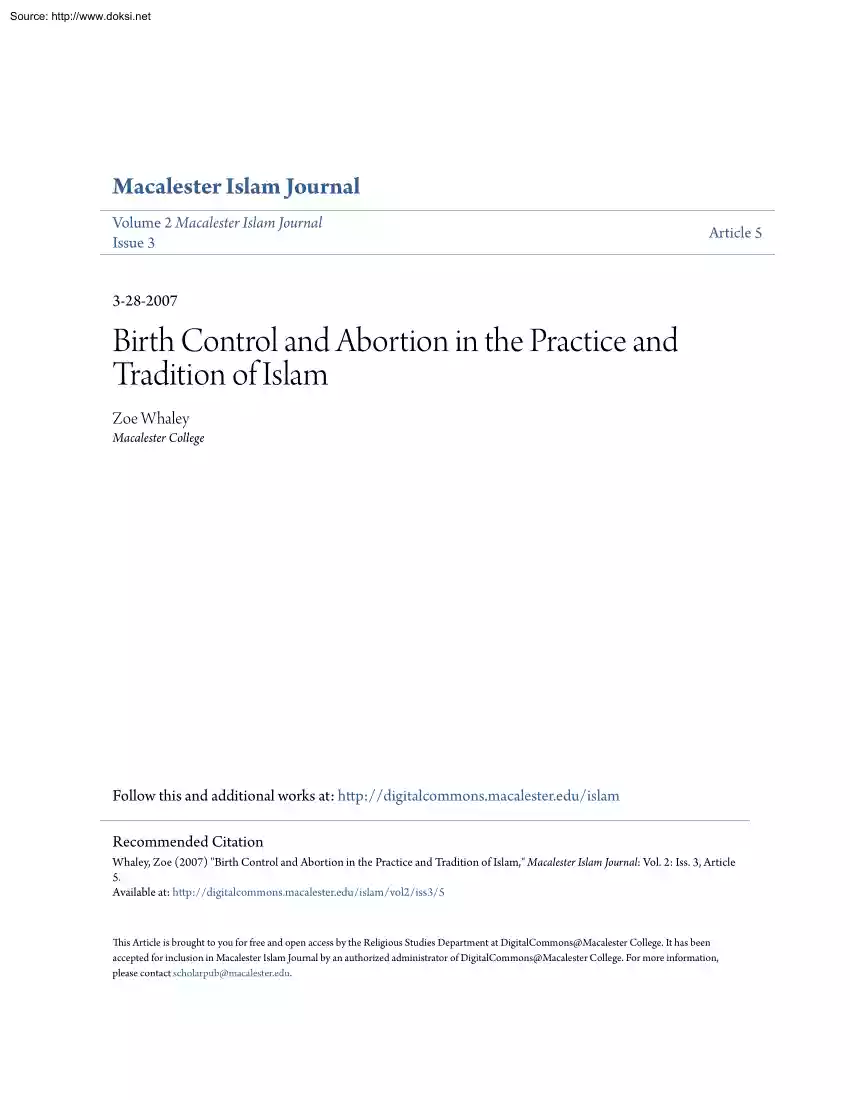
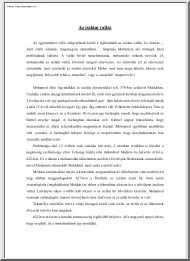
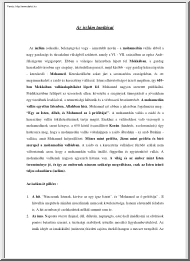
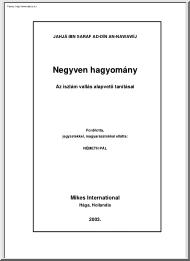
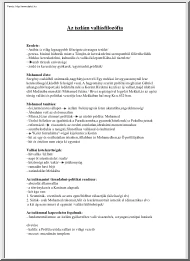
 Just like you draw up a plan when you’re going to war, building a house, or even going on vacation, you need to draw up a plan for your business. This tutorial will help you to clearly see where you are and make it possible to understand where you’re going.
Just like you draw up a plan when you’re going to war, building a house, or even going on vacation, you need to draw up a plan for your business. This tutorial will help you to clearly see where you are and make it possible to understand where you’re going.